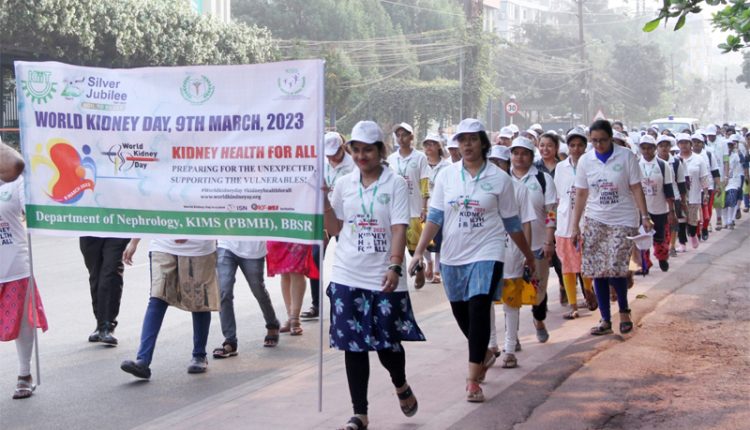World Kidney Day 2023: KIMS Experts Urge Health Emergency Plan for Kidney Disease Patients During Emergencies
Bhubaneswar, March 9: Nephrologists at Kalinga Institute of Medical Sciences (KIMS), a constituent of KIIT-DU, have made a strong plea for bringing kidney-related ailments under the ambit of health emergency plans because of recurring natural disasters and other events like the recent pandemic.
The appeal came on a day when people the world over are celebrating World Kidney Day to sensitize the masses about the role of the kidney in maintaining a healthy life. KIMS Nephrology Department organised a walkathon in the morning, with the participation of students from KIMS, KINS and KISS.
A Continuing Medical Education (CME) was also organised in the afternoon, addressed by Prof Emeritus and renowned nephrologist Dr SC Dash, Prof Nephrology KIMS Dr S. B Rout, Advisor and Senior Consultant Nephrology KIMS Dr AP Pattanaik, HOD Nephrology, AIIMS Bhubaneswar Dr Sandip Panda, HOD Nephrology SCBMCH, Cuttack Prof Dr Aruna Acharya and HOD Nephrology, KIMS, Dr Nikunj Kishore Rout.
Pro Vice-Chancellor Prof CBK Mohanty, Principal Brig Prof Dr AP Mohanty, Medical Superintendent KIMS Prof RC Das, Vice-Principal and Prof of Medicine KIMS Dr Subhranshu Patro, HoD Department of Medicine KIMS Prof Dr Lalatendu Mohanty and Prof Dr SB Rout chaired the sessions and also participated in the CME.
“We urge the disaster and healthcare management authorities in the Government to include the non-communicable disease, especially kidney disease and renal transplant groups as vulnerable groups during disasters. Secondly, the healthcare system needs to be adaptive, robust and resilient, incorporating the essential public health emergency preparedness elements to function, optimally in and out of an emergency /disaster,” said Dr Nikunj Kishore Rout, HOD Nephrology.
“We live in a predictable world which is waiting to plunge itself into health crises or natural disasters. As the rate of natural disasters and other devastating events caused by human activities is increasing day by day, the burden of health and well-being of the non-communicable disease, especially the kidney disease patients have seen an exceptional rise,” Dr Rout said.
Conventionally, the health emergency plan did not include kidney or non-communicable disease care. During the COVID-19 pandemic, people living with non-communicable diseases faced worse outcomes than those without. It was because these patients needed sophisticated care, equipment and trained medical staff. Hence during an emergency, were the most vulnerable groups.
Underlining the need for a good Public Health Emergency Preparedness (PHEP) Plan, he said that the move could be visualised as a wheel with the outer rim formed by governance and good leadership. The centre or the axis of the wheel is ethics and values and the spokes supporting the health care system are the planning process, collaborative networks, community, engagement, risk analysis, surveillance and monitoring, practice, and experience, resources, building workforce capacity and good communication.

